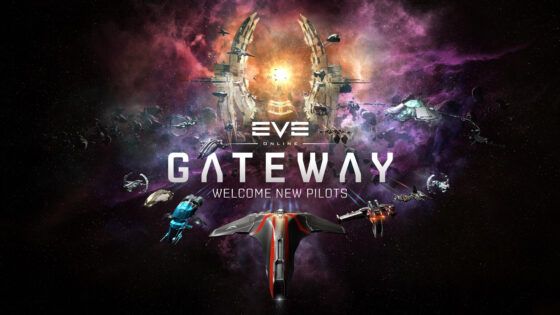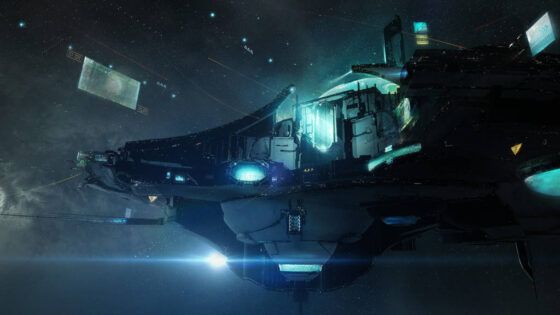We’re back with another great interview with the directors of EVE Online - CCP Brand Director Sæmundur Hermannsson and CCP Creative Director Bergur Finnbogason. In this month’s edition, we’ll be delving into the latest quadrant of Gateway, Skill Plans, the new-player experience, pivotal moments to come, hidden gems of EVE Online literature, and a look at New Eden’s very own military industrial complex.
Alex: How did Gateway go?
Bergur: Really well. We kicked off the quadrant with the new player experience and the update to our skill system, Skill Plans. It's a monumental moment for us as a studio in many ways even though it might not sound like much – a 30-minute experience for new players and an update to how we view skills. But for us this marks an important step that we're taking together as a dev studio to really address this huge new player problem we've been facing for the last 18 years. It's a process we've been working on for a very long time and so it's great to see it out of the gates. The initial numbers look absolutely fantastic. We’ve seen the median first session length extending by 50% in some cases and by 100% in others. Which is pretty fantastic.
Sæmi: It’s been awesome. We’ve been hammering this message home to the community, especially the hardcore community, for the last two years. Ever since EVEsterdam in March 2019. Now the first phase has been delivered, it’s just been great to see the reception from the veteran community, from press, and from new players themselves trying out the game. This is just the first step on a journey, but it’s a really good indication of where we’re going and why.
Bergur: And following that, we’ve had a very successful rollout of EVE on the Epic Game Store. So that's a brand-new group of players and a new breed of players that is coming into our world. You know you have Steam and Epic, the big players, the storefronts of gaming today; you would be surprised how different these customers are. They're not one-to-one. Yes, there’s overlap but less than one would think; so that's a super exciting moment and opportunity for us.
Alex: That’s interesting, how do the players coming in on Epic and Steam differ? And how do you adapt to meet them?
Sæmi: Naturally, we saw a huge, huge spike in the beginning from Epic. It’s a gigantic platform. One of the things we’ve often been discussing internally is the need to meet players where they are; whether that’s different platforms or different age groups or different hardcore requirements…EVE Anywhere is a great example of that. So right now we’re adding a new layer to the EVE Online cake. Epic users are accustomed to different things, a lot of them were coming from Fortnite, for example, so we sample launched with a Cyber Suit Pack to try to cater to them. How we’ll evolve going forward on Epic remains to be seen. We’ll be monitoring it and experimenting with it as we do on all platforms.
Alex: And how are PAPI and Imperium looking now? Are they the best of friends yet?
Bergur: Aha, well. It has been interesting to follow the post-war movements. A lot of things seem to have settled down. But with PAPI, well whether they even exist right now depends on who you ask. They’re having a bit of a post-war identity crisis; a reorganization. You’ll get differing answers from different people. It’s like back in the day, “who won the war?” I’m not sure there’s a correct answer.

Bergur: Right now, we’re still going through a massive rebuild phase. Since the war wrapped up, we’ve seen a lot of the old industrialists return to the game and really help with revitalizing the arsenals. The uptick in player numbers, player activities, and playstyles after a war is always an interesting thing to follow. And vice versa, whenever you see a region has a major drop in mining, we know that there is something brewing in that region and another war likely on its way.
Alex: And these old industrialists, during the war have they been taking a break from playing or have they just been partaking in different activities?
Bergur: Some have certainly been pulling back from playing. Others will play with multiple accounts and simply switch from industry-focused accounts to more aggressive accounts during wartime. Industry during wartime is needed of course, but it’s way more dangerous. They’re easy targets to shoot down. So, most Capsuleers, groups, and factions start tapping more into peacetime reserves. Once those resources run low, you can see prices of ore really start to move in the big trades.
Alex: To what degree does New Eden mimic the world’s military industrial complex? Are there third parties benefiting from war?
Bergur: Oh massively, absolutely! There are small industrial corporations that you can put in orders for say, 20 Nyxes and they’ll deliver it to your doorstep in X number of days. And when your own reserves and arsenal are running low, you start looking more and more towards those corporations, those “industrial mercenaries” to fulfil your needs. And in some cases, these corporations are helping all sides.

Alex: That was my next question. Returning to these wartime and peacetime playstyles, is that a consistent in EVE’s history?
Bergur: Absolutely. Throughout our history. Because the wars spark so much discourse in the popular, regular media, you always see an influx of new players coming in whose interests were sparked by the dynamics of the war. Then in peacetime you have the reactivation of players, those that come back in. While we’re known as the big battle PvP game, that’s far from the only playstyle. This battling playstyle is, relatively speaking, an unpopular one. So much more of the focus is on the preparation. Getting a man on the moon is more than just three blokes in a spacecraft getting blasted up; it’s the thousands of people pulling all-nighters to get them there. And that also applies to EVE Online.
Alex: Talking of what’s happening in the background, I recently came across Empires of EVE by Andrew Groen and realised just how expansive the literature based around New Eden is. Much of it fills a unique space that can be considered both fiction and non-fiction; it’s difficult to know where to draw the distinction. Have you explored the world of EVE literature, and do you have any reading recommendations for us?
Bergur: Well, I think the Empires of EVE books are absolutely fantastic literature for anyone who is interested in EVE. They’re historical non-fiction in a way, they’re looking at real-life events in the game; the actual wars that have happened. And they’re a fantastic documentation of the ins and outs of these wars. I’m so looking forward to when Andrew Groen writes about the war that’s just wrapped up. Because it was the longest war in the history of the game, it was so complicated. There were so many moments where I thought the war was ending but it ended up becoming even more dramatic. Without doubt, there will be many twists and turns that will remain undiscovered until his book is ready. It could be years; he’ll need to interview everyone and cross reference everything that everyone is saying. Not to mention interpreting what people actually mean when they say they won. Empires at War is such a beautiful meta thing. I think it’s the most EVE thing ever. It’s a book that isn’t commissioned by us providing a historian’s analysis of the goings on of the game.
Sæmi: Oh fine, you take that one Bergur. As you can tell, I 100% agree. Andrew manages to tell the stories of EVE and how spectacular they are, these tens of thousands of people at war with tens of thousands of others. But the platform of EVE, the achievements and the stories could have global appeal, they’re that kind of cool. And what Andrew does is share them with a wider platform of people who are more casual or who even don’t know much about EVE at all. That’s what I think is so awesome about it; it increases the reach and awareness of EVE and the actions of the EVE players – it spreads that fascination with EVE that we all share.
 Empires of EVE by Andrew Groen
Empires of EVE by Andrew Groen
Bergur: As a company we’ve also written fiction around EVE; we have a lot of short stories and chronicles online that we hopefully get to revitalise soon. There are a lot of stories in the universe that haven’t been told yet. It’s a universe of 7700 solar systems and even more planets. On each planet you have millions, billions, or trillions of inhabitants each with their own feelings and stories to tell. We’ve just scratched the surface of what is possible in New Eden as a universe and as a place to explore.
Sæmi: I’d also like to give a shout-out to something more niche. I’ve only just stumbled upon this one myself, it’s the Chronicles of EVE but read in a podcast by a person called EVE Reader on YouTube. It’s been a while since he last updated it, but there’s a lot of stuff there and I think there’s potential there to bring the super cool Chronicles of EVE to the masses. There’s lots of cool concept art in it too. Go and check it out, it’s really fantastic stuff – Bergur and I were discussing it the other day, being fangirls ourselves. It’s the embodiment of what an EVE podcast on the Chronicles could be. It’s a sin how few people know about it.
We run these monthly EVE Online interviews regularly; readers can find them by searching via topic or by browsing the full catalogue.
MMOGames.com is committed to bringing you all the freshest, funniest, and most insightful MMO news. If you enjoyed this content, why not share it with your community? And make sure that you never miss our updates and exclusive giveaways by following and favouriting us on Instagram, Twitter, and Facebook.